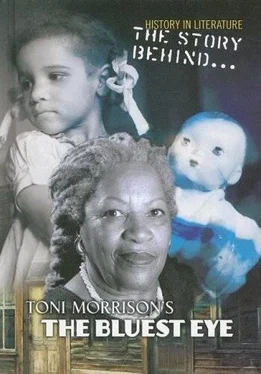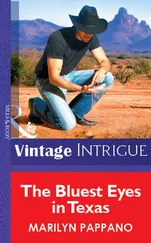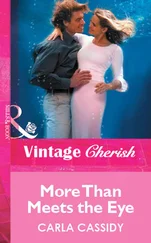The young ones smiled it little. They looked at my stomach and between my legs. They never said nothing to me. Only one looked at me. Looked at my face, I mean. I looked right back at him. He dropped his eyes and turned red. He knowed, I reckon, that maybe I weren't no horse foaling. But them others. They didn't know.
They went on. I seed them talking to them white women: 'How you feel? Gonna have twins?' Just shucking them, of course, but nice talk. Nice friendly talk. I got edgy, and when them pains got harder, I was glad. Glad to have something else to think about. I moaned something awful. The pains wasn't as bad as I let on, but I had to let them people know having a baby was more than a bowel movement. I hurt just like them white women. Just 'cause I wasn't hooping and hollering before didn't mean I wasn't feeling pain.
What'd they think? That just 'cause I knowed how to have a baby with no fuss that my behind wasn't pulling and aching like theirs? Besides, that doctor don't know what he talking about. He must never seed no mare foal. Who say they don't have no pain?
Just 'cause she don't cry? 'Cause she can't say it, they think it ain't there? If they looks in her eyes and see them eyeballs lolling back, see the sorrowful look, they'd know. Anyways, the baby come. Big old healthy thing. She looked different from what I thought. Reckon I talked to it so much before I conjured up a mind's eye view of it. So when I seed it, it was like looking at a picture of your mama when she was a girl. You knows who she is but she don't look the same. They give her to me for a nursing, and she liked to pull my nipple off right away. She caught on fast. Not like Sammy, he was the hardest child to feed. But Pecola look like she knowed right off what to. A right smart baby she was. I used to like to watch her. You know they makes them greedy sounds. Eyes all soft and wet. A cross between a puppy and a dying man. But I knowed she was ugly. Head full of pretty hair, but Lord she was ugly."
When Sammy and Pecola were still young Pauline had to go back to work. She was older now, with no time for dreams and movies. It was time to put all of the pieces together, make coherence where before there had been none. The children gave her this need; she herself was no longer a child. So she became, and her process of becoming was like most of ours: she developed a hatred for things that mystified or obstructed her; acquired virtues that were easy to maintain; assigned herself a role in the scheme of things; and harked back to simpler times for gratification. She took on the full responsibility and recognition of breadwinner and returned to church. First, however, she moved out of the two rooms into a spacious first floor of a building that had been built as a store. She came into her own with the women who had despised her, by being more moral than they; she avenged herself on Cholly by forcing him to indulge in the weaknesses she despised. She joined a church where shouting was frowned upon, served on Stewardess Board No.3, and became a member of Ladies Circle No. i. At prayer meeting she moaned and sighed over Cholly's ways, and hoped God would help her keep the children from the sins of the father. She stopped saying "chil'ren" and said "childring" instead. She let another tooth fall, and was outraged by painted ladies who thought only of clothes and men. Holding Cholly as a model of sin and failure, she bore him like a crown of thorns, and her children like a cross. It was her good fortune to find a permanent job in the home of a well-to-do family whose members were affectionate, appreciative, and generous. She looked at their houses, smelled their linen, touched their silk draperies, and loved all of it. The child's pink nightie, the stacks of white pillow slips edged with embroidery, the sheets with top hems picked out with blue cornflowers. She became what is known as an ideal servant, for such a role filled practically all of her needs. When she bathed the little Fisher girl, it was in a porcelain tub with silvery taps running infinite quantities of hot, clear water. She dried her in fluffy white towels and put her in cuddly night clothes. Then she brushed the yellow hair, enjoying the roll and slip of it between her fingers. No zinc tub, no buckets of stove-heated water, no flaky, stiff, grayish towels washed in a kitchen sink, dried in a dusty backyard, no tangled black puffs of rough wool to comb. Soon she stopped trying to keep her own house. The things she could afford to buy did not last, had no beauty or style, and were absorbed by the dingy storefront. More and more she neglected her house, her children, her man-they were like the afterthoughts one has just before sleep, the early-morning and late-evening edges of her day, the dark edges that made the daily life with the Fishers lighter, more delicate, more lovely. Here she could arrange things, clean things, line things up in neat rows. Here her foot flopped around on deep pile carpets, and there was no uneven sound. Here she found beauty, order, cleanliness, and praise. Mr. Fisher said, "I would rather sell her blueberry cobblers than real estate." She reigned over cupboards stacked high with food that would not be eaten for weeks, even months; she was queen of canned vegetables bought by the case, special fondants and ribbon candy curled up in tiny silver dishes. The creditors and service people who humiliated her when she went to them on her own behalf respected her, were even intimidated by her, when she spoke for the Fishers. She refused beef slightly dark or with edges not properly trimmed.
The slightly reeking fish that she accepted for her own family she would all but throw in the fish man's face if he sent it to the Fisher house. Power, praise, and luxury were hers in this household. They even gave her what she had never had-a nickname-Polly. It was her pleasure to stand in her kitchen at the end of a day and survey her handiwork. Knowing there were soap bars by the dozen, bacon by the rasher, and reveling in her shiny pots and pans and polished floors. Hearing, "We'll never let her go. We could never find anybody like Polly. She will not leave the kitchen until everything is in order. Really, she is the ideal servant."
Pauline kept this order, this beauty, for herself, a private world, and never introduced it into her storefront, or to her children. Them she bent toward respectability, and in so doing taught them fear: fear of being clumsy, fear of being like their father, fear of not being loved by God, fear of madness like Cholly's mother's. Into her son she beat a loud desire to run away, and into her daughter she beat a fear of growing up, fear of other people, fear of life. All the meaningfulness of her life was in her work. For her virtues were intact. She was an active church woman, did not drink, smoke, or carouse, defended herself mightily against Cholly, rose above him in every way, and felt she was fulfilling a mother's role conscientiously when she pointed out their father's faults to keep them from having them, or punished them when they showed any slovenliness, no matter how slight, when she worked twelve to sixteen hours a day to support them. And the world itself agreed with her. It was only sometimes, sometimes, and then rarely, that she thought about the old days, or what her life had turned to. They were musings, idle thoughts, full sometimes of the old dreaminess, but not the kind of thing she cared to dwell on.
"I started to leave him once, but something came up. Once, after he tried to set the house on fire, I was all set in my mind to go. I can't even 'member now what held me. He sure ain't give me much of a life. But it wasn't all bad. Sometimes things wasn't all bad. He used to come easing into bed sometimes, not too drunk. I make out like I'm asleep, 'cause it's late, and he taken three dollars out of my pocketbook that morning or something. I hear him breathing, but I don't look around. I can see in my mind's eye his black arms thrown back behind his head, the muscles like great big peach stones sanded down, with veins running like little swollen rivers down his arms. Without touching him I be feeling those ridges on the tips of my fingers.
Читать дальше











